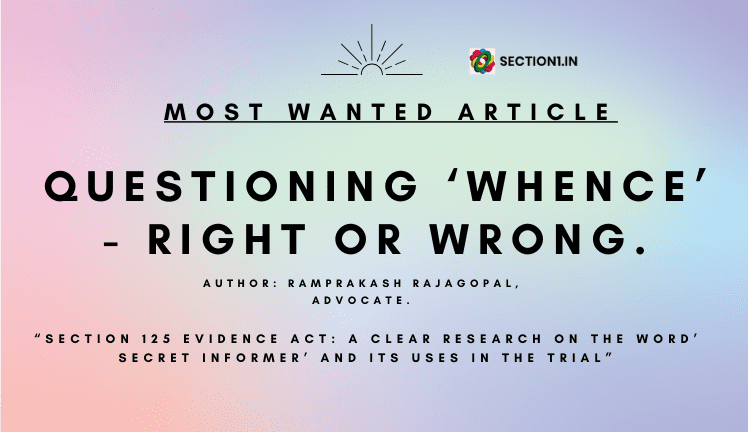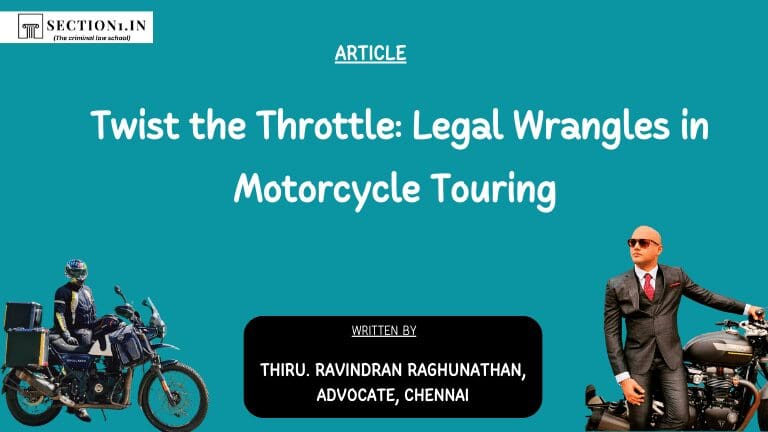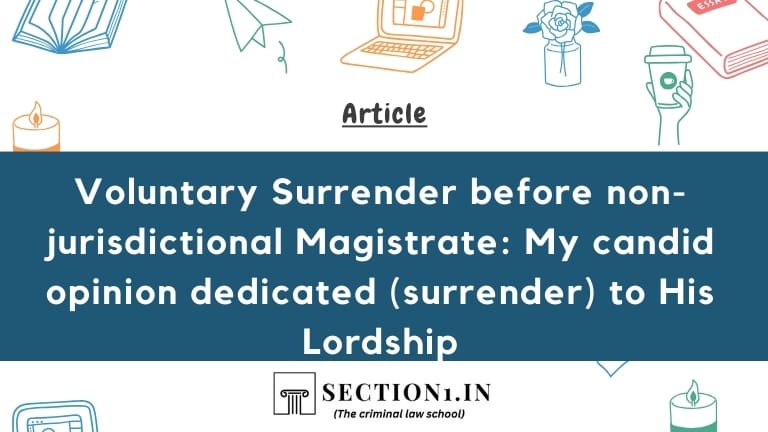Questioning “whence” – right of wrong?
Introduction
I saw many defence counsels are not prepared or choose (do not) to ask questions to the witnesses (Police and or Magistrate) concerning the informer (secret informer) and the information (secret information) received from him/them. If I would say in exact words, counsels are not probing the witness to answer from ‘whence’ he/she has received the information (secret information).
For the purpose of this article the word ‘compel’ contemplated under section 125 of the Indian Evidence Act shall have to be appreciated in the context as per sections 132 read with 147 of the Evidence Act and Article 20(3) of Constitution of India.
Numerous trial judges and Public Prosecutors (then and now) are objecting defence counsels during the cross-examination of a police officer when they started questioning the informer and information. They are all under the impression that the defence counsels have no right to ask questions about the informer or the information; Where did this wrong proposition emanate from? I wonder!
What does section 125 Evidence Act says?
By immense reading of section 125, it is not the word ‘state or say’ engrafted instead the word ‘compel’ has been written, which has to be understood as it is. In other words, the defence counsel may very well ‘ask’ the witness to ‘state or say’ from whence he received the information instead of requesting the court to ‘compel’ him.
It is worthwhile here to state that only Judges (presiding officers) may compel the witness either suo-moto or upon filing the application made orally or in writing by the parties. Even Trial judges are barred to put questions to compel the witnesses with regard to the proviso of section 165 Indian Evidence Act., 1860.
Section 125 Evidence Act comes under the chapter ‘Of Witnesses’, which definitely speaks about the ‘privilege’ of the witness is to disclose the correct and exact facts with information before the court in the interest of justice and not hiding the same, though the word ‘privilege’ does not found under this section. In any case, what shall not be disclosed in the court is not the privilege of a witness. The witness may very well disclose the identity of the informer. On the other hand, what is available to the witness under section 125 Evidence Act is the ‘liberty’ that the witness shall not be compelled to disclose the same. Worldly difference is there between ‘privilege’ and ‘Liberty’ I must add.
D.Weston vs. Peary Mohan Dass Judgment
In an age-old judgment D.Weston vs. Peary Mohan Dass reported in 1913 (40) ILR(Cal) 898 his Lordship Hon’ble Mr JUSTICE WOODROFFE has held as follows which is the bone of the contention for section 125 Evidence Act:
“I will only add as regards Section 125 of the Evidence Act that though the section does not in express terms prohibit the witness, if he be willing, from saying whence he got his information, both the English authorities from which the rule is taken and a consideration of the foundation of the rule show that the protection should not be made to depend upon a claim of privilege being put forward, but that it is a duty of the Judge apart from objection taken to exclude the evidence. A fortiori if objection is taken, it cannot, since the law allows it, be made the ground of adverse inferences against the witness”.
Though there are many judgments that speak about the informer, this is the judgment that clarifies the proposition.
There is nothing in the section that precludes the witness from disclosing if he is willing to say whence he got the information. The phrase which is used in the section is ‘compelled to say’ and not ‘say’. In other words, if the witness is ready or willing to say/state about the source of the information then it is not ‘illegal’ to disclose the same. Equally, it is not illegal to ‘ask’ the witness to say from whence he got the information. Besides, the witness may say/state the source only when the question is put to him which is definitely during the cross-examination.
In a case, if information was given by a “secret informer” to the police regarding the selling of contraband in a public place by the accused and the raiding party (police officials) went to that place and arrested the accused with the contraband then there is no necessity in the trial to put questions about informer. Whereas, in another case, if the so-called “secret informer” after being given the information, took the raiding party to the place where the contraband was sold and further identified the accused, does not come within the purview of his conduct (taking the raiding party to the place) under section 8 of the Evidence Act? And the act of identifying the accused was not relevant under section 9 of the Evidence Act (though hit u/s 162 Cr.P.C)? In this scenario, if the Investigation Officer is not ready to disclose the source even after the source was in the limelight then the court may very well appreciate the evidence under section 114(g) of Indian Evidence Act., 1872 [Bhugdomal Gangaram and others vs. State of Gujarat – (1983)1 SCALE 411].
Is there anything under the law as ‘secret investigation’?
It is needless to say section 125 Evidence Act., 1872 does not protect the witness from answering about the information. Also, there is no provision (or such thing) under any Indian Law to do a “Secret Investigation” by the Investigation Officer. In fact, a “secret investigation” and the outcome of ‘secret investigation’ is against the provision of Indian Law.
Apart from the above, there is a misconception that this section will apply to the information regarding the whereabouts of the accused during the investigation. For example., in a given case (for instance a murder case) if an investigation officer is searching for the accused who has fled away ( I will not use the word abscond inasmuch it shall be decided only by the court and not by the I.O) and has received a piece of information as if the accused is standing in a bus stand. Now, the I.O with his team went to the spot, arrested the accused, and obtained a “voluntary confession” (as we know in every case) does not come within the purview of section 125 Evidence Act. Because, “standing in a bus stand” is not an offence under any Act and hence the trial lawyers may very well drill the Investigation Officer regarding the arrival, mode of arrest, and other facts necessary to disprove the discovery/recovery. To that effect, the following judgment will be a useful reference:
“The only evidence on this circumstance is of the Investigating Officer (PW.10) who has stated that during the course of investigation he received secret information to the effect that the appellant was seen fleeing away wearing only undergarments and in order to verify the same, he left the police station along with the armed forces in search of the accused, went to the house of one Mithlesh Jha (husband of appellant’s sister) at Village Murli where he was informed that Chandra Mohan Mishra, father of the appellant, had gone there in search of him and he having not found him there, went to the place of other relatives for searching him. This witness has nowhere stated from whom he received the secret information inasmuch as such information cannot be made a basis to prove this circumstance for being used against the appellant [KANHAI MISHRA @ KANHAIYA MISAR vs STATE OF BIHAR – (2001) CriLJ 1259 (SC)=(2001) 2 SCALE 338=(2001) 3 SCC 451=(2001) SCC(Cri) 537=(2001) 2 SCR 160=(2001) 2 Supreme 180 also read SURENDER … Appellant – Versus – STATE – (2009) 6 ILR(Delhi) 549 – CRL. A. No. 21/1994 – 03.07.2009]”
Non-Explanation of secret informer is fatal to the prosecution – judgments
In Re: Nangil N.V. Rajendran and another – (1972) LW(Cri) 185.
Informer not examined – hearsay: Bhugdomal Gangaram and Others versus State of Gujarat – 1983 (1) Scale 411=AIR 1983 SC 906.
Discovery/Recovery & Informer: KANHAI MISHRA @ KANHAIYA MISAR vs STATE OF BIHAR – (2001) CriLJ 1259 (SC)=(2001) 2 SCALE 338=(2001) 3 SCC 451=(2001) SCC(Cri) 537=(2001) 2 SCR 160=(2001) 2 Supreme 180.
Nagaraj vs. State – Crl. Appl. No: 305 of 2014; Dt: 02.09.2015 – [Mdu].
Origin of secret information is unknown
Bijender @ Mandar vs. State Of Haryana– (2022) 1 MLJ (Cri) 179(SC – 3 Judge Bench)=(2021) 13 SCALE 325(SC – 3 Judge Bench)=(2022) 1 SCC 92 (SC – 3 Judge Bench)=(2022) 1 SCC(Cri) 189(SC – 3 Judge Bench).
14. …… Ergo, the very identity of the Appellant as one of the perpetrators stands obscured, particularly, considering that all the accused in the case were arrested on the basis of a secret information, the origin of which is naturally unknown.
Source of information towards offence not disclosed by witness
GUNA MAHTO vs. STATE OF JHARKHAND – CRIMINAL APPEAL NO.108 OF 2012 – 16th March, 2023
10.Samodhi Yadav (PW-9), uncle of the deceased, residing in village Maran, only states that Ram Brijesh Yadav (co-villager) informed him that his daughter-in-law (the deceased) had eloped with someone residing in village i.e. Maran. Since he doubted such statement, he went to village Janho, the place of the matrimonial house of the deceased and was informed that since previous evening, none had seen the deceased. The body of the deceased was found only on the date of recovery from the well of the village. He expressed his doubt, “…that accused had killed his wife and had thereafter thrown her into the well”. This being the only statement that he made against the accused. But what is his source of such information, he does not disclose. In any event such a deposition is only in the nature of hearsay and no more, which is also uncorroborated. However, significantly, he admits that the accused had already reported the matter to the Police and that no case of ill-treatment of the deceased was ever registered against the appellant.
No secret investigation allowed: Katturaja and anr vs. State – (2013)2 CTC 72 (MAD)=(2013) 1 LW(Cri) 134=(2013) 1 MWN(Cri) 267.
No secrecy in custody of documents: Public Prosecutor Vs M.N. Govindaraja Mudaliar And Others – 1954 Cri.L.J 1624.
Indian Evidence Act., 1872 – Chapater IX – Of Witnesses – Section 118. Who may testify?
Again, coming back to the square one, even a superficial glance at section 118 Evidence Act., 1872 clears our doubt in the question on hand, which is as follows:
All persons shall be competent to testify unless the Court considers that they are prevented from understanding the questions put to them, or from giving rational answers to those questions, by tender years, extreme old age, disease, whether of body or mind, or any other cause of the same kind.
Explanation – A lunatic is not incompetent to testify, unless he is prevented by his lunacy from understanding the questions put to him and giving rational answers to them.
The above provision (section 118 Evidence Act) does not bar the Court from examining the “so-called” informer or secret informer (in colloquial use of the term). In other words, the prosecution has no right or intellect to stop the prerogative of the court to allow all persons to testify (including the “so-called” informer or secret informer) before it, except the persons contemplated in section 118 Evidence Act., 1872 “Explanation” part in which the ‘so-called’ informer is not a part.
Art. 20 (3) of Indian Constitution
Further, as per Article 20(3) of the Constitution of India which bars the accused to be ‘compelled’ to be a witness against himself, but the accused can do so (to be a witness against himself), if there is no ‘compulsion’ is being proved. In other words Article 20(3) only bars the ‘compulsion’ and not otherwise. Suppose if the accused wants to be an approver and brings the offence into the light, he can very well do so by examining himself as a ‘prosecution witness’ without any compulsion. Same analogy is to be applied for section 125 Indian Evidence Act., 1872 also.
Again as I said earlier what is the ‘privilege’ of witness is, to disclose the correct and exact facts with information before the court in the interest of justice and not hiding the same.
185th Law Commission recommendation – Amendment of section. 125 Evidence Act
Further the 185th Law Commission of India in Annexure (The Indian Evidence Act Amendment Bill, 2003) recommended the subjection matter as follows:
71. In section 125 of the principal Act, the following Exception shall be inserted at the end, namely:-
“Exception: Nothing in this section shall apply where it appears to the Court that the giving of the information is a fact in issue on which the liability of a party depends or is otherwise a material fact, and the Court, for reasons to be recorded and in the interests of justice, directs the disclosure of such information by the Magistrate, Police officer or Revenue officer”.
Conclusion
The proposition is thus, I saw numerous trial judges and Public Prosecutors (then and now) objecting defence counsels during the cross-examination of a police officer when they started questioning about informer and the information which in my legal opinion is against the law.
Author: Ramprakash Rajagopal, Advocate.
Co-Author of this Article with regard to the resource presented as to185th Law Commission of India (in this subject matter) is Thiru. K.Rajavel B.A.LL.B, practicing in Thirupattur Courts. Tamilnadu.






